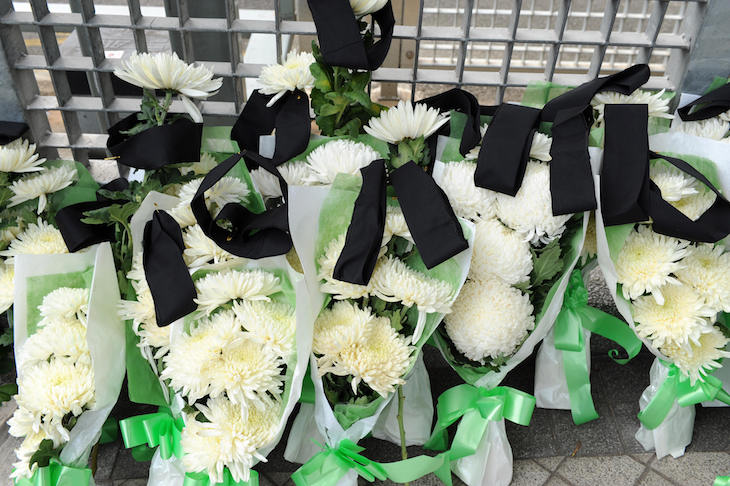Here come three novels marketed as debuts but written by authors with some sort of previous, be it in short stories, journalism, theatre, television or a combination of the above.
The Alarming Palsy of James Orr by Tom Lee (Granta, £12.99) takes a fable and transplants it into real life — in this case bourgeois southern British suburban life — where the neat conclusions we might draw from it if we encountered it in a more distilled form are muffled and made strange. The exemplar of Kafka is obvious (both Metamorphosis and The Trial); but I found myself thinking also of John Cheever, Richard Yates and other American writers who needle away at the pain and self-delusion behind the sleek lives of the executive class.
James Orr isn’t much of an unreliable narrator, just an ordinary, appalling white-collar mook, who has found himself in what would, in other hands, have been a classic horror-story location: New Glades, a 1960s development, ‘built on ancient woodland owned by a monstrously wealthy private trust’. He is the sort of homme moyen sensuel who is given rather more sympathetic life in Jon Canter’s much underrated Worth.
Suddenly and inexplicably deformed by disease, James is treated badly by all except his children. In due course, after a period of anomie and uprootedness, he finds himself acting badly in return to everyone he meets, including his children — though rather less badly than many would in his shoes.
Heather, The Totality by Matthew Weiner (Canongate, £14.99) is a lean, sharp meta-thriller. The writing is laconic and assured, though Weiner can be cloth-eared at times, using the same preposition slightly differently twice in a sentence, and so on. But as storytelling goes — or, given Weiner’s celebrated work on Mad Men, storyboarding — it is superb.
Heather is the impossibly fragrant daughter of an unhappy Manhattan couple (her father, Mark, is not a million miles away from James Orr, except that he works in finance, and is ‘rich but not rich-rich’). A dark star enters their lives in the form of Bobby, a construction worker and matricide, whose life up until now has been a long murk of poverty interrupted by incandescent outbursts of violence.
In short paragraphs the book darts between Mark, Heather, Bobby and Karen, Heather’s mother (or rather Mother — the archetypal roles get a capital letter, as in a play or a psychiatrist’s case history), setting out an ever-hastening plot, showing how the players misunderstand not just one another but the potentially fatal circumstances they find themselves in. Heather, despite her allegedly prodigious capacity for empathy, mistakes what lies behind Bobby’s dead eyes about as seriously as it’s possible to mistake anything.
The novel probably intends some sort of comment about money and ennui; the perils of living vicariously through others; masculinity in crisis — though it’s a recrudescence of masculinity that saves the day — and the Monster Inside Us All. But it doesn’t give itself room to say anything interesting about any of these things. Its gestures towards sophistication, such as the notion (not borne out, as far as I can tell) that psychopaths automatically have the sensory hyperacuity of a Guerlain ‘nose’, tend to let it down. But you do tear through it — and you’re not quite sure what you think when you’ve finished.
In State of Emergency (Epigram, £10) there’s a strong case for seeing common ground between its author, Jeremy Tiang, and its subject. (Like his protagonist Henry, Tiang is a youngish Oxford-educated Singaporean.) But it doesn’t really read like a personal project — and why should it? It’s well researched, informative and even-handed in its view of a chapter of Singapore’s history about which many of us know little; but the human factor is underpowered.
There are three key events: the alleged massacre of 24 male villagers by British troops at Batang Kali in 1948; the decision some years later by an impassioned young Chinese-speaking freedom fighter, Siew Li, to dodge the authorities, leave her husband Jason and their twins, Janet and Henry, in Singapore, and go ‘inside’ — to train with communist militias in the jungle; and the final illness and death of Jason, which brings Henry winging his way home, having set aside his research on the Habsburgs to abseil down his own familial crevasse.
You’re left with a sense of of intense personal loss, and of the complexities of the region. But on the political front, other than underlying racial tensions — it’s clear that, as elsewhere in the area, communism was a rallying point for Chinese minorities, oppressed or otherwise, before it was any sort of belief system — there’s not much debate about the rights and wrongs of it all. On the emotional front, I’d have liked more about Siew Li and Jason after their parting: why she found it so easy to ‘move on’, and he so difficult. But then it’s not my story.






Comments